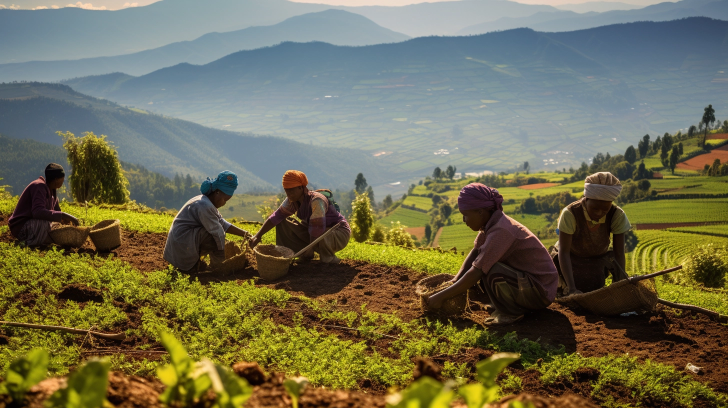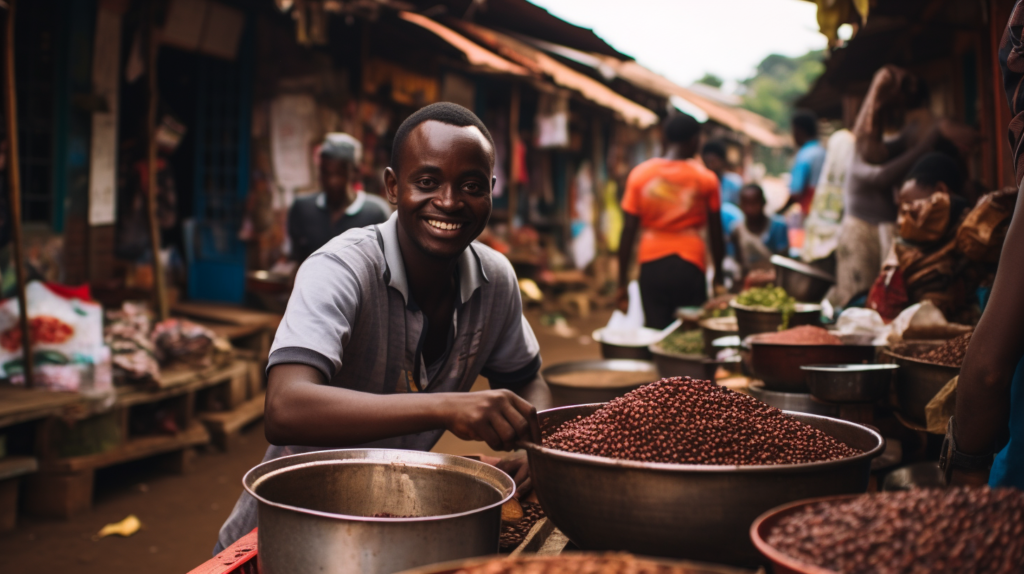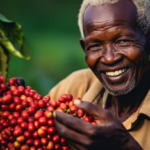Are you a coffee lover curious about Rwanda’s unique coffee culture? In 1994, Rwanda faced challenges in its coffee industry due to the genocide. This blog will explore the significance of Rwandan coffee and how it has become an economic pillar for the country. Discover the rich heritage and future prospects of Rwanda’s coffee culture!
Key Takeaways
- Rwanda’s coffee culture is vital for its economy, making coffee one of the biggest agricultural exports. The focus on high-grade specialty coffee highlights Rwanda’s dedication to quality over quantity.
- Kigali’s café scene is thriving, blending modern trends with traditional coffee rituals. This evolution promotes local consumption and appreciation for Rwandan beans internationally.
- Coffee represents community spirit in Rwanda, symbolizing hospitality and generosity. Social gatherings around coffee strengthen connections within communities.
- Sustainable farming practices support the environment and enhance the unique flavors of Rwandan coffee influenced by volcanic soil and altitude.
- Governmental and international efforts are boosting Rwanda’s position on the global stage, turning it into a model for producing exceptional specialty coffees while fostering economic growth through ethical practices.
Introduction to the significance of coffee in Rwanda’s cultural and economic landscape.
Coffee in Rwanda isn’t just a drink; it’s a big part of culture and economy. This small country has turned its coffee industry into one of the largest and most profitable agricultural exports.
The journey hasn’t been easy, but through resilience, innovation, and sustainable practices, Rwandan coffee now enjoys global recognition for its unique flavors.
For many Rwandans, however, enjoying their coffee is hard due to high prices. With over 60% of the population earning less than $2 per day, local consumption faces significant hurdles.
Yet, there’s hope: the government’s efforts to boost domestic consumption among the emerging middle-class show promise. Initiatives like “Let’s Talk Coffee” aim to deepen locals’ understanding and appreciation of coffee by highlighting traditional brewing methods and health benefits.
Meanwhile, Kigali’s vibrant café scene offers glimpses of a flourishing future for local consumption where communities unite over a shared love for quality beans.
Moving from the broader role of coffee in Rwanda, it’s essential to focus on its current impact rather than dig into how and where coffee growing started. This approach helps us understand the present culture and economy without dwelling on past hardships.
German and Belgian colonizers introduced coffee to Rwanda, forcing Rwandans into cultivation without sharing the joy of drinking it.
Today, we see a vibrant shift with the government promoting coffee culture through education, affordability, and health benefits. We highlight Rwanda’s progress in making coffee a key economic driver and cultural emblem by highlighting these modern efforts instead of historical specifics.
This narrative celebrates empowerment and growth in Rwandan communities tied closely to coffee production.
The Rise of Coffee in Rwanda’s Economy

Rwanda’s economy has been transformed by the pivotal role of coffee, with government and international efforts enhancing its growth. Discover how this has impacted the country’s economic landscape.
Read more about Rwanda’s thriving coffee culture and its global impact.
Discussion on how coffee has become a pivotal economic asset for Rwanda.
Coffee has turned into a key player in Rwanda’s economy. After facing a tough time following the 1994 genocide, the country’s coffee sector rebounded strongly. Now, it stands as one of the biggest and most profitable parts of Rwanda’s farming industry.
The government, trade partners, and private investors have focused on producing high-quality specialty coffee.Rwandan Bourbon Arabica beans are especially sought after worldwide.
This shift towards quality over quantity helped boost Rwanda’s position in global markets. Today, 99% of its coffee heads overseas, showcasing Rwandan coffee on international stages like competitions and festivals.
Efforts are underway to grow the domestic market, aiming at the rising middle class with more money to spend. Coffee cultivation supports local farmers and greatly affects community development and environmental sustainability efforts nationwide.
Highlighting governmental and international efforts to enhance the coffee sector.
As coffee plays a starring role in Rwanda’s economy, government, and international community efforts aim to polish this gem further. The Rwandan government has put money into specialty coffee, focusing on the sought-after Bourbon Arabica beans.
They aren’t stopping there. Training for baristas is now a big deal, with programs designed to boost the quality of coffee served across hotels and restaurants.
Partnerships have also flourished beyond borders, bringing investors eager to tap into Rwanda’s vibrant coffee scene. These initiatives are not just about farming; they’re about building a culture that values and understands high-quality coffee.
Through seminars and tasting events, consumers get up close to the rich flavors that Rwandan soil nurtures. All these moves point towards one goal: making Rwanda synonymous with world-class coffee while empowering local communities economically.
The Growing Coffee Scene in Kigali

Kigali’s café culture is transforming the local coffee industry, marrying traditional Rwandan coffee rituals with modern urban trends. To learn more about this exciting fusion and its impact, dive deeper into our exploration of Rwanda’s vibrant coffee culture.
Examination of the burgeoning café culture in Kigali and its impact on the coffee industry.
Kigali’s emerging café culture is shaping Rwanda’s coffee scene. The rise of modern coffee shops is attracting a diverse range of locals and visitors, creating new spaces for socializing, networking, and savoring artisanal brews.
As Rwanda’s urban centers embrace the cafe lifestyle, they catalyze increased local coffee consumption while influencing the demand for high-quality Rwandan beans beyond its borders.
This trend underscores the potential for a thriving local market alongside Rwanda’s well-established reputation in global specialty coffee circles.
Exploration of how urban cafes are incorporating and modernizing traditional coffee rituals.
Urban cafes in Kigali are adding a modern twist to traditional coffee ceremonies, making them more accessible and enjoyable for locals and visitors alike. With their inviting ambiance, these cafes serve as bustling hubs for professionals, freelancers, and friends gathering over a steaming cup of Rwandan coffee.
The government’s efforts to train baristas have further elevated the quality of locally roasted coffee served at restaurants and hotels, contributing to the revitalization of local consumption.
These urban spaces play a pivotal role in promoting the appreciation of Rwandan coffee among its own people.
The Cultural Significance of Coffee in Rwanda
Coffee in Rwanda symbolizes community, hospitality, and generosity – it’s an integral part of social gatherings. Its significance goes beyond a beverage; it embodies the cultural fabric of Rwanda.
Dive deeper into the rich tapestry of Rwandan coffee culture by delving into our blog!
Coffee as a symbol of community, hospitality, and generosity within Rwandan society.
In Rwandan society, coffee is more than just a beverage; it symbolizes togetherness and hospitality. It’s deeply rooted in communal rituals, bringing people together and creating strong connections within the community.
Each cup of Rwandan coffee tells a story of tradition, reflecting the resilience and vibrant spirit of the nation. This cultural significance transforms every sip into an experience celebrating heritage, generosity, and warmth.
Moving forward to our exploration of how this rich culture has impacted the growing coffee scene in Kigali..
Insight into the social gatherings and community events centered around coffee.
Discover the vibrant and communal spirit of Rwandan coffee culture through various social gatherings and community events. At these lively affairs, coffee acts as a catalyst for connection, bringing people together to share stories, ideas, and laughter over steaming cups of rich Rwandan brew.
Whether it’s a traditional coffee ceremony or a modern cafe meet-up, unity and togetherness are palpable in every sip.
Partake in the heartwarming tradition of gathering around ceremonial coffee rituals that symbolize hospitality and generosity within Rwandan society. These events offer an immersive experience into the cultural significance of coffee, allowing you to engage with local communities while savoring exceptional flavors unique to Rwanda’s volcanic soil and altitude-influenced beans.
Exploring the Production of Rwandan Coffee
Discover modern farming techniques and the unique flavor profiles of Rwandan coffee, influenced by the country’s volcanic soil and altitude. Delve deeper into the rich world of Rwandan coffee production – a journey worth exploring!
Insight into the modern farming techniques and the role of cooperatives in coffee production.
Modern farming techniques in Rwanda’s coffee production, such as shade-grown and agroforestry practices, aim to promote ecological sustainability. These strategies not only enhance the quality of coffee but also preserve biodiversity.
Additionally, cooperatives play a vital role in empowering local farmers by providing training in efficient cultivation methods and ensuring fair trade practices, contributing positively to the community and the environment.
Furthermore, the use of eco-friendly processing techniques ensures that Rwandan coffee maintains its exceptional flavor profiles while aligning with global standards for organic and sustainable farming.
Discussion on the unique flavor profiles of Rwandan coffee, influenced by the country’s volcanic soil and altitude.
Rwandan coffee boasts flavor profiles influenced by the country’s volcanic soil and high altitude. These conditions impart a distinct brightness, with floral and citrus notes, creating a delicate yet complex taste.
The beans grown at higher altitudes also exhibit a pronounced sweetness and vibrant acidity, making Rwandan coffee highly sought after in the specialty market. Rwanda’s volcanic terroir imparts unique flavor characteristics that appeal to coffee enthusiasts seeking an exceptional sensory experience.
The country’s volcanic soil and high altitude provide ideal conditions for cultivating Arabica Bourbon beans recognized for their vibrant flavors. As a result, Rwandan coffee offers delicate floral aromas, bright acidity, and sweet citric undertones coveted by discerning palates worldwide.
The Role of Coffee in the Rwandan Economy
Rwandan coffee forms a vital part of the country’s economy, contributing significantly to its GDP through export and providing employment and development opportunities in local communities.
To explore this crucial economic asset more, delve deeper into the blog.
Coffee as a major export product and its significant contribution to Rwanda’s GDP.
Rwanda’s coffee industry is vital to the country’s economy, significantly contributing to its GDP. The government and private investors have focused on high-grade specialty coffee, with Rwandan Bourbon Arabica beans in high demand on the global stage.
While Rwanda currently exports 99% of its coffee, efforts are underway to expand the domestic market, targeting the emerging middle class with increased disposable income.
The blending of rich Rwandan history and robust economic impact makes exploring this topic worthwhile for any coffee lover.
The support coffee farming provides to local communities through employment and development initiatives.
Coffee farming plays a crucial role in uplifting local communities by offering employment opportunities and contributing to economic development. With coffee being a major export product for Rwanda, it provides jobs for numerous individuals, empowering them to support their families and contribute to the country’s economy.
Additionally, through various development initiatives, coffee farming helps improve infrastructure, education, and healthcare in these communities.
Engaging in coffee production not only offers livelihoods but also fosters community growth and sustainability. The industry empowers local farmers by providing them with the means to improve their quality of life while also fostering a sense of pride and ownership within their communities.
Why Coffee is Enjoying a Revival in Rwanda
Rwanda’s coffee culture is experiencing a revival due to economic reforms, the specialty coffee movement, and global recognition. Discover how these factors are shaping Rwanda’s vibrant coffee industry!
Factors contributing to the revival of Rwanda’s coffee culture include economic reforms and the specialty coffee movement.
Economic reforms and the specialty coffee movement have played key roles in reviving Rwanda’s coffee culture. With investments from the government, trade partners, and private investors, focusing on high-grade specialty coffee has propelled Rwandan Bourbon Arabica beans into high demand globally.
Additionally, the rise of coffee shops in Kigali has bolstered local consumption as cafes serve as social hubs for professionals, freelancers, and friends to meet and enjoy quality Rwandan coffee.
The global recognition of Rwanda’s exceptional coffee flavor profiles, combined with the support from local professionals driving the economy, further solidifies the revival of Rwanda’s vibrant coffee culture.
The global recognition of Rwandan coffee and its impact on the industry.
The global recognition of Rwandan coffee has elevated its status in the international coffee scene, with its unique flavor profiles and high-quality Bourbon Arabica beans gaining attention from specialty markets worldwide.
The increasing demand for Rwandan coffee has provided local farmers with economic opportunities, empowering them to further develop their sustainable farming practices and contribute to the country’s growing economy.
Rwanda’s emergence as a key player in the global coffee industry has not only enhanced its reputation as a top coffee producer but also positioned it as a model for other emerging coffee-growing regions striving for excellence in quality and taste characteristics.
Rwanda’s impressive success stories of artisanal coffee brands have showcased the country’s dedication to producing exceptional coffees while maintaining environmentally friendly practices.
This increased global reach benefits Rwanda’s economy and highlights the positive impact on local communities through employment opportunities and advancement initiatives.
Challenges and Opportunities for Rwandan Coffee
Rwandan coffee faces environmental and market access challenges but has opportunities for growth in the specialty coffee market and sustainable farming practices. Discover how Rwanda is overcoming obstacles to establish its position in the global coffee industry.
Addressing the environmental and market access challenges facing Rwanda’s coffee industry.
Due to climate change impacting its coffee-growing regions, Rwanda’s coffee industry faces environmental challenges. The changing climatic conditions require innovative strategies for sustainable farming practices, such as shade-grown and eco-friendly approaches to conserve the coffee landscapes.
Moreover, market access challenges are evident in the need for certifications and quality control to meet global market trends and competitions, ensuring Rwandan coffee producers can maintain their international acclaim while supporting local industry.
As Rwanda addresses these environmental and market access challenges, it aims to empower farmers through technological advancements in production methods and quality control while promoting eco-friendly practices.
The efforts align with the cultural heritage of Rwandan coffee traditions, fostering future economic growth that supports local industry and community impact.
Opportunities for growth within the specialty coffee market and sustainable farming practices.
The specialty coffee market offers exciting potential for Rwandan farmers and coffee enthusiasts. Embracing sustainable farming practices not only ensures the preservation of Rwanda’s natural resources but also enhances the quality and uniqueness of Rwandan coffee.
As a coffee lover, you play an integral role in supporting the local industry by seeking out and appreciating the sustainably cultivated Rwandan Bourbon Arabica beans.
By directly trading with Rwanda’s coffee cooperatives, you contribute to empowering farmers and promoting ethical practices within the global coffee community. Additionally, as the demand for organic and shade-grown coffee rises, there is an opportunity to explore innovative methods that preserve both cultural heritage and environmental conservation, ultimately enriching your experience as a consumer.
Rwanda on the Global Coffee Stage
Rwanda’s emergence in the international coffee scene is transforming global markets and gaining acclaim for its unique coffee varieties and quality. Discover the impact of Rwandan coffee on the world stage!
Rwanda’s emergence in the international coffee scene and its impact on global markets.
Rwanda has made a significant mark in the global coffee arena, attracting attention with its high-grade specialty coffee. The demand for Rwandan Bourbon Arabica beans has surged, showcasing the country’s potential to positively influence the international coffee market.
With trading partners and investors supporting this growth, Rwanda’s emergence reshapes global perceptions of African coffee production and the cultural waves of coffee.
As a result of this recognition, Rwanda’s impact on global markets is noteworthy. The rise of Rwandan coffee brands has garnered acclaim internationally, contributing to revitalizing the country’s economy and positioning it as an influential player in the specialty coffee movement.
Success stories of Rwandan coffee brands and the international acclaim of Rwandan coffee.
Rwandan coffee brands have garnered international acclaim for their exceptional quality and unique flavor profiles. The country’s focus on high-grade specialty coffee, particularly the sought-after Rwandan Bourbon Arabica beans, has propelled its presence in global markets.
With a recovery from the aftermath of the 1994 genocide, Rwanda’s coffee industry has made significant strides to become a major player in the international coffee scene.
These success stories have not only elevated Rwandan coffee brands but also contributed to the economic growth and recognition of Rwanda as a prominent coffee-producing nation. As a result, more and more people are discovering and appreciating the richness and distinctiveness of Rwandan coffee.
The Richness of Rwandan Coffee Culture
Experience the vibrant and diverse world of Rwandan coffee culture – it’s a journey worth taking! For more fascinating insights, delve into our blog where we uncover the captivating tales of Rwanda’s coffee heritage and its role in shaping the country’s cultural identity.
Summarizing the dynamic nature of Rwanda’s coffee culture and its future prospects.
Rwanda’s coffee culture is a vibrant tapestry woven with tradition and innovation. After the devastation of the 1994 genocide, the country’s coffee industry has emerged as an economic powerhouse, fueled by high-grade specialty coffee and global acclaim for Rwandan Bourbon Arabica beans.
The rise of Kigali’s bustling café scene points to a promising future for local consumption, turning cafés into social hubs attracting business professionals, freelancers, and friends.
With increased domestic focus and international collaborations in play, Rwanda’s rich coffee heritage continues to evolve with exciting prospects on the horizon.
Reflecting on the cultural heritage and economic importance of coffee in Rwanda.
Coffee in Rwanda carries deep cultural significance, being more than just a beverage. It symbolizes community, hospitality, and generosity within Rwandan society. From social gatherings to community events, coffee plays a central role in bringing people together.
Furthermore, the economic importance of coffee cannot be overstated. Not only is it a major export product contributing significantly to Rwanda’s GDP but also provides vital support to local communities through employment and development initiatives.
The rich cultural heritage embedded in every brewed cup of Rwandan coffee tells a compelling story of tradition and unity while also driving economic growth for the country.
FAQs
1. What makes Rwanda’s coffee culture special?
Rwanda’s coffee culture is unique because of its traditional consumption, bean-to-cup practices, and the government’s role in supporting local industry through coffee festivals and farmer empowerment initiatives.
2. How do coffee competitions contribute to Rwanda’s cultural significance?
Coffee competitions help improve coffee quality by encouraging innovation in brewing and tasting methods among baristas, which supports the growth of a rich barista culture within the country.
3. Can you learn about coffee making in Rwanda?
Yes! Through various government initiatives and local support, there are opportunities for people to get involved in coffee education, research, and taste exploration to understand more about organic coffee production and conservation efforts.
4. Why is supporting local Rwandan coffee important?
Supporting local Rwandan coffee helps empower farmers by promoting sustainable agricultural practices within the sector. It also contributes to urban development and cultural preservation through traditional methods of brewing organic coffees.

5. Are there any festivals dedicated to Rwandan Coffee Culture?
Indeed! Coffee festivals play a significant role in celebrating Rwanda’s revival of its rich coffee narratives by showcasing innovation, offering tastes from different regions, promoting farmer achievements, and highlighting agronomy research efforts dedicated to enhancing the nation’s bean quality.






